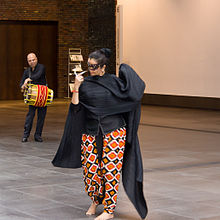
Cornelius "Sonny" Fortune was an American jazz saxophonist. He played soprano, alto, tenor, and baritone saxophones, clarinet, and flute.

Rabih Abou-Khalil is an oud player and composer born in Lebanon, who combines elements of Arabic music with jazz, classical music, and other styles. He grew up in Beirut and moved to Munich, Germany, during the Lebanese Civil War in 1978.

Howard Levy is an American musician. A keyboardist and virtuoso harmonica player, he "has been realistically presented as one of the most important and radical harmonica innovators of the twentieth century."

Gabriele Mirabassi is an Italian jazz clarinetist.
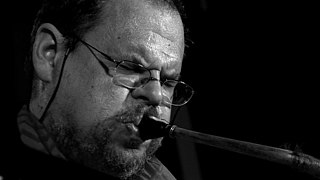
Michel Godard is a French avant-garde jazz and classical musician. He plays tuba and the predecessor of the tuba, a brass instrument known as the serpent.
Mark Nauseef is an American drummer and percussionist who has enjoyed a varied career, ranging from rock music during the 1970s with his time as a member of the Ian Gillan Band and, temporarily with Thin Lizzy when Brian Downey left for a short time, to a wide range of musical styles in more recent times, playing with notable musicians from around the world.

Embryo is a world music band from Munich, West Germany that began in 1969. Its origins have even been traced to the 1950s in the city of Hof, when musicians Christian Burchard and Dieter Serfas met at the age of 10. The band was described by one critic as "the most eclectic of the krautrock bands."
The Karnataka College of Percussion (KCP) is a music school in Bangalore, Karnataka, India, which is dedicated to the teaching of the Carnatic percussion and vocal music of South India. It was founded in approximately 1964 by the mridangam player T. A. S. Mani.

Roman Bunka was a German guitarist, oud player and composer, active in world music and jazz fusion bands. He lived most of his life in Munich, Bavaria, where he was involved in various musical crossover projects.

Milton Cardona was a percussionist, vocalist and conga player from Mayagüez, Puerto Rico.

Blue Camel is an album by the Lebanese oud player and composer Rabih Abou-Khalil. The album fuses traditional Arabic music with jazz. It was recorded in 1992 and released on the Enja label.

Al-Jadida is an album by the Lebanese oud player and composer Rabih Abou-Khalil, fusing traditional Arab music with jazz, which was recorded in 1990 and released on the Enja label the following year.

Tarab is an album by the Lebanese oud player and composer Rabih Abou-Khalil, fusing traditional Arab music with jazz, which was recorded in 1992 and released on the Enja label the following year.

The Sultan's Picnic is an album by the Lebanese oud player and composer Rabih Abou-Khalil, fusing traditional Arab music with jazz, which was recorded in 1994 and released on the Enja label.
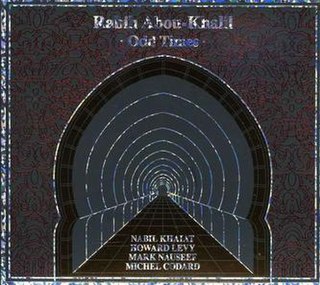
Odd Times is a live album by the Lebanese oud player and composer Rabih Abou-Khalil which was recorded in Germany in 1997 and released on the Enja label.

The Cactus of Knowledge is an album by the Lebanese oud player and composer Rabih Abou-Khalil which was recorded in Germany in 2000 and released on the Enja label the following year.

Morton's Foot is an album by the Lebanese oud player and composer Rabih Abou-Khalil which was recorded in Germany in 2003 and released on the Enja label.
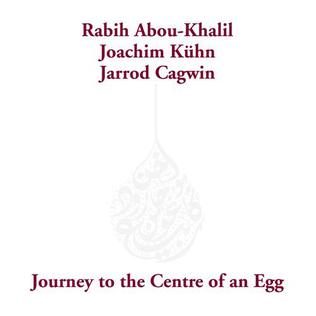
Journey to the Centre of an Egg is an album by the Lebanese oud player Rabih Abou-Khalil with German pianist Joachim Kühn and percussionist Jarrod Cagwin which was recorded in Germany in 2004 and released on the Enja label the following year.
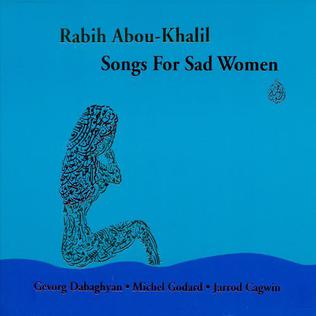
Songs for Sad Women is an album by the Lebanese oud player and composer Rabih Abou-Khalil which was recorded in Germany in 2005 but not released on the Enja label until 2007.
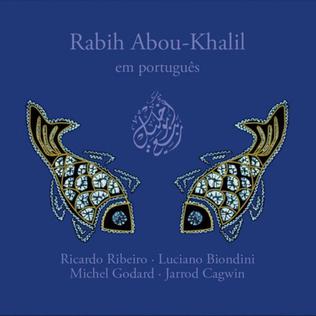
Em Português is an album by the Lebanese oud player and composer Rabih Abou-Khalil which was recorded in Germany in 2007 and released on the Enja label the following year.
